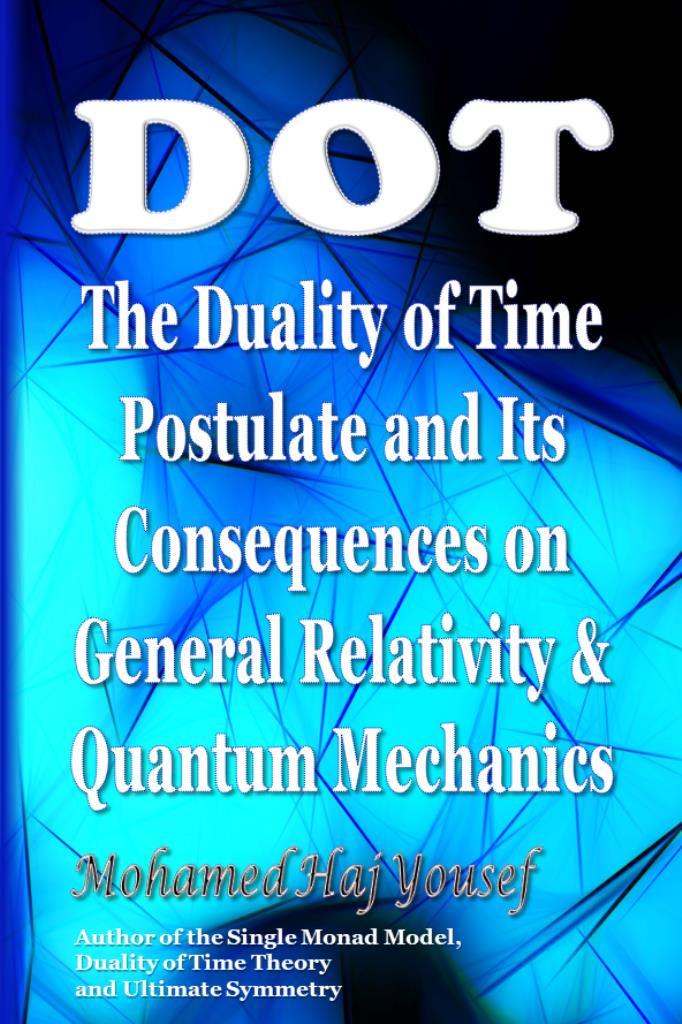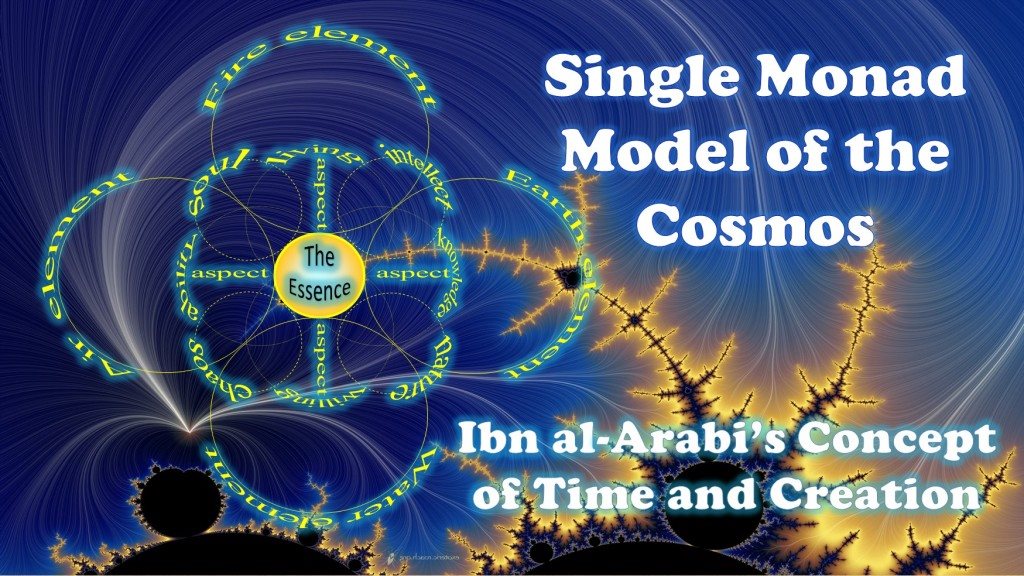Most of these introductory articles are exracted from Volume I of the Single Monad Model of the Cosmos: Ibn al-Arabi's View of Time and Creation... more on this can be found here.
The Age
So the days are repeated cycles of different 'orbs', whether celestial or divine: every orb has its own day. These days overlap with each other, so as the day of the sun, for example, takes 360 days of our days that we count on the earth; the day of the moon takes twenty eight normal earth days, and so on. In one sun day, many moon days pass; and in one moon day, many normal earth days pass - just as in one 'Lord-day', one thousand sun days (earth-years) pass. Likewise, all the possible days of all orbs and divine Names happen and repeat themselves in the 'Day of the Age' that 'is one Day that never repeats, and it has no daytime (nahar) nor night' [III.202.5]. The Day of the Age is all a 'daytime': it does not have a night, because there is no orb above it; it is the truly all-encompassing orb that includes all material and spiritual orbs.
Ibn al-Arabi, like other Sufis, consider that 'the Age' (al-dahr) is one of the divine Names of Allah, according to a hadith in which the Prophet Muhammad says: 'Do not damn the Age, for Allah is the Age' [Kanz: 8137]. In another divine saying (Hadith qudsi), Allah says: 'the son of Adam hurts Me: he damns the Age, and I am the Age, the command in My Hand, I circulate the daytime and the night' [Kanz: 8139].
Also in the Holy Qur’an, Allah says: 'and they say: What is there but our life in this world? We shall die and we live, and nothing but the Age can destroy us. But of that they have no knowledge: they merely conjecture' (45:24).
In his comments on this last verse, Ibn al-Arabi affirms that they (the disbelievers) are quite right in their claim that nothing but the Age can destroy them, because Allah is the Age - though they did not mean that, but rather meant simply time, and not 'the Age' as a name of Allah [IV.265.29].
We have seen above that 'the time of a thing is its presence': this is why Allah is named as 'the Age', because the realities of everything exist in Him. So He is 'the Age' because the whole world (hidden and manifest), including all space and time, from eternity without beginning (al-azal) to eternity without end (al-abad): all this is a manifestation of Allah's divine Names - so the Age is the all-encompassing orb of all Names [IV.266.11]. Ibn al-Arabi explains this by saying:
Do not you see in Allah's words (the Qur’an) when He told us about things in the past, He then used the past tense, and He used the future tense for things to come, and He used the present tense for the now-happening things, …, and if we seek for all that something that has a real existence and these things are occurring in it - which is for them like a container - we shall find nothing, neither by mind nor by sense, except that we find it as an imaginary container, which is itself contained by another imaginary container, and so on, nothing but endless illusion. So if you think rationally, you will find that there is nothing (i.e., no 'containing' reality of space or time) that can be comprehended by imagination or by the mind, nor by the senses, nothing but the Real Existence on which our existence is based.
For this reason He named Himself to us as 'the Age', so that the reference can be only to Him, not to 'time' as imagined, because there is no Ruler (hakim) other than Allah, and in Him appeared the realities of things and their properties. So He is the everlasting existence, and the realities of things with their properties appeared from behind the veil of His existence, but because of His subtleness (latafa), we see the realities of things, which are ourselves, from behind the veil of His existence without seeing Him, just like we see the stars from behind the veil of the heavens (the orbs) and yet we do not see the heavens.
[III.547.1]
Moreover, given the above definition of the Age, it is not possible to imagine a plural form of this word in this meaning. Yet Ibn al-Arabi himself sometimes uses it as plural, when he speaks about the 'first age' or the 'age of ages' from which time appeared: 'from that (eternity) is the Prophet's saying: "Allah is/was, and none with Him" (Kanz: 29850), and this is a rare knowing known only by the "Solitary Sages" (al-afrad) among men. That is what is called "the first age" and "the age of ages": and from this eternity (azal), time emerged.' [I.156.35]
This could be slightly confusing, but there are some references in Ibn al-Arabi's writing that seem to parallel what is known in modern cosmology as the 'bubbles' model of the universe, where the universe is full of black holes that cause a large curvature in space-time in such a way that each can be considered as a separate space-time similar to - and as large as - our own; except that each is only a single point in our space-time. Thus Ibn al-Arabi affirms that 'each part of the world can be a cause for another world similar to it' [I.259.25]. Also Ibn al-Arabi considers that the origin of the world that we live in is the Universal Intellect, who is originally only one of an unknown number of roaming Spirits whom Allah created directly without any intermediaries [III.430.5]. Any one of these primordial Spirits is, therefore, capable of making another universe, just like the Universal Intellect that made our universe. Also we may recall that Allah in the Qur’an is repeatedly called the 'the Lord of the worlds', in the indefinite plural, and not only of this world. However, the Arabic word for 'the age' has also been conventionally used sometimes for other related meanings such as eternity without beginning (azal) and eternity without end (abad); so Ibn al-Arabi showed that the plural form 'ages' (duhur) could also be used to include or refer to all these terms, since they all are essentially the Age [IV.266.5].
On the other hand, the Age is not only time, but it is also space. Because the Age is the totally 'encompassing orb', it must include everything inside it, spatial as well as temporal. As we shall show in section III.6, the world as both space and time is created in the seven days of the divine Week (six Days for space, plus Saturday for time). And the Age is not more than those divine seven Days [II.438.5]. Thus in Ibn al-Arabi's conception, space and time have the same meaning as days, and both are unified as space-time, where the divine Week is its basic unit, and the Age is in fact this Single Week.
... Space Transcendence Read this short concise exploration of the Duality of Time Postulate: DoT: The Duality of Time Postulate and Its Consequences on General Relativity and Quantum Mechanics ...
... anz: 29850), and this is a rare knowing known only by the "Solitary Sages" (al-afrad) among men. That is what is called "the first age" and "the age of ages": and from this eternity (azal), TIME EMERGED .' [I.156.35] This could be slightly confusing, but there are some references in Ibn a ...
... t that made our universe. Also we may recall that Allah in the Qur’an is repeatedly called the 'the Lord of the worlds', in the indefinite plural, and not only of this world. However, the Arabic word for 'the age' has also been conventionally used sometimes for other related meanings suc ...
... er, the Arabic word for 'the age' has also been conventionally used sometimes for other related meanings such as eternity without beginning (azal) and eternity without end (abad); so Ibn al-Arabi showed that the plural form 'ages' (duhur) could also be used to include or refer to all these ...
... black holes that cause a large curvature in space-time in such a way that each can be considered as a separate space-time similar to - and as large as - our own; except that each is only a SINGLE POINT in our space-time. Thus Ibn al-Arabi affirms that 'each part of the world can be a caus ...
... t has no daytime (nahar) nor night' [III.202.5]. The Day of the Age is all a 'daytime': it does not have a night, because there is no orb above it; it is the truly all-encompassing orb that INCLUDES AL l material and spiritual orbs. Ibn al-Arabi, like other Sufis, consider that 'the Age' (a ...
... fusing, but there are some references in Ibn al-Arabi's writing that seem to parallel what is known in modern cosmology as the 'bubbles' model of the universe, where the universe is full of BLACK HOLES that cause a large curvature in space-time in such a way that each can be considered as ...
... orb that includes all material and spiritual orbs. Ibn al-Arabi, like other Sufis, consider that 'the Age' (al-dahr) is one of the divine Names of Allah, according to a hadith in which the Prophet Muhammad says: 'Do not damn the Age, for Allah is the Age' [Kanz: 8137]. In another divine s ...
... re than those divine seven Days [II.438.5]. Thus in Ibn al-Arabi's conception, space and time have the same meaning as days, and both are unified as space-time, where the divine Week is its BASIC UNIT , and the Age is in fact this Single Week. Read Other Books: The Single Monad Model of the ...
... : and from this eternity (azal), time emerged.' [I.156.35] This could be slightly confusing, but there are some references in Ibn al-Arabi's writing that seem to parallel what is known in MODERN COSMOLOGY as the 'bubbles' model of the universe, where the universe is full of black holes t ...
... ther world similar to it' [I.259.25]. Also Ibn al-Arabi considers that the origin of the world that we live in is the Universal Intellect, who is originally only one of an unknown number of roaming Spirits whom Allah created directly without any intermediaries [III.430.5]. Any one of these ...
... (al-dahr) is one of the divine Names of Allah, according to a hadith in which the Prophet Muhammad says: 'Do not damn the Age, for Allah is the Age' [Kanz: 8137]. In another divine saying (Hadith qudsi), Allah says: 'the son of Adam hurts Me: he damns the Age, and I am the Age, the comman ...














